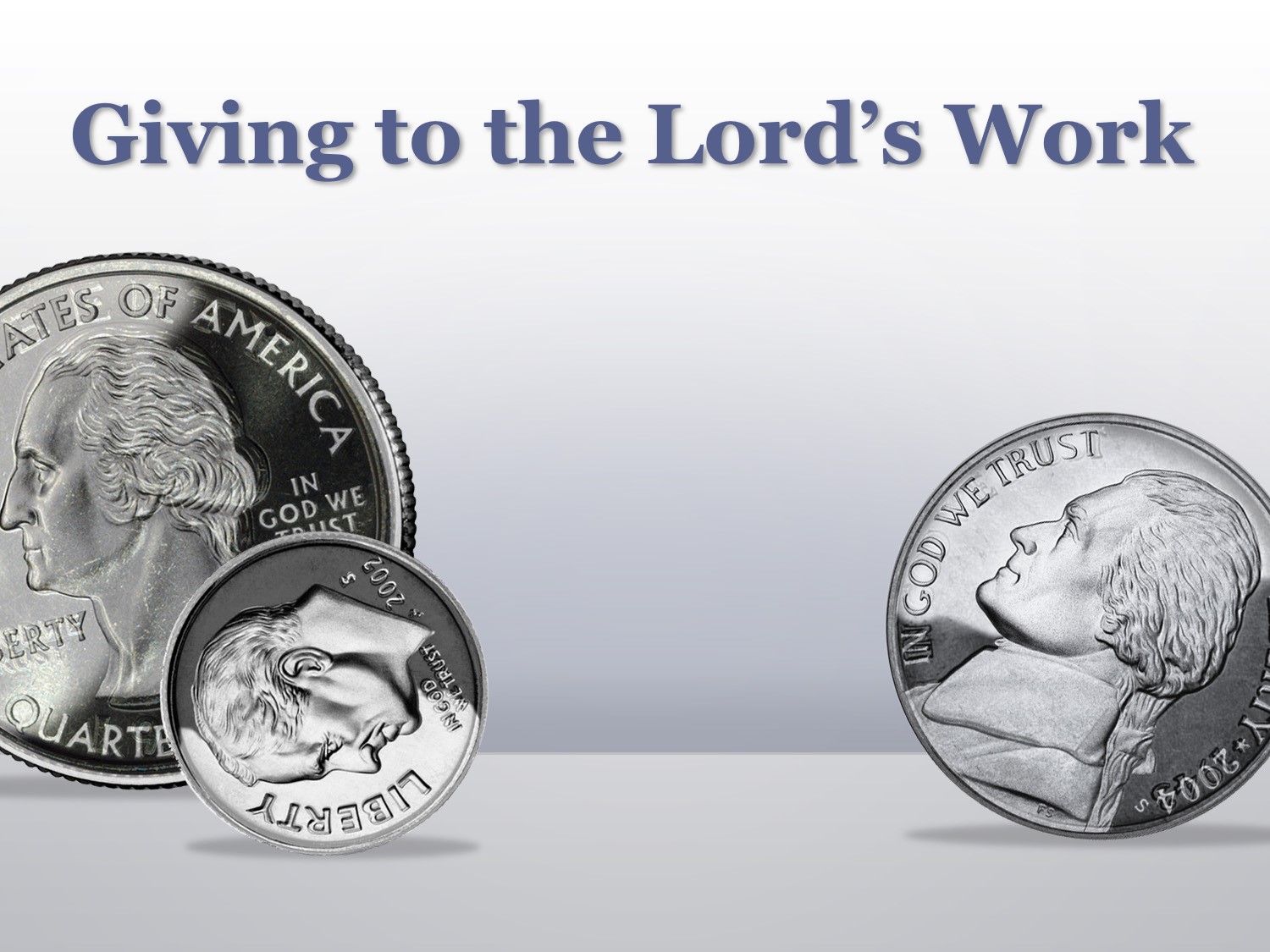Blog
A-Cappella Singing and Baptism
Thursday, June 06, 2019

We’re talking apples and elephants here, right? Sure, most of the denominational world disagrees with the churches of Christ about both of these things, but they’re very different kinds of issues. There are a dozen passages in the New Testament that explicitly say that we have to be baptized to be saved. There aren’t any passages in the New Testament that explicitly say we had better not use musical instruments in worship, or else.
And yet, I’ve noticed something funny about the progressive churches that end up taking “of Christ” off the sign. They’re going to bring in the instrument. That’s a given. They’re going to engage the community church down the street in the battle of the bands. To the most skilled go the visitors!
Along with that, though, they start getting awfully mushy about baptism. Consider, for instance, this video produced by The Hills Church, formerly the Richland Hills Church of Christ. The men in the video say that baptism is commanded. True. They say that baptism is an expression of our commitment to Christ. Also true.
Notice what they’re not saying, though. They’re not saying that baptism is necessary for forgiveness of sins. At one point, Rick Atchley scoffs at the notion that water washes away sins, never mind Acts 22:16. He says we’re saved by the blood of Jesus instead, making a distinction that the Bible never makes.
Additionally, if someone starts attending The Hills who was sprinkled as an infant, they say they will encourage them to get baptized as an adult. Why? Because they need to make that commitment for themselves rather than having their parents make it for them. They do not say that such people need to be baptized in order to be saved from their sins.
What in the world? As I noted above, the Scriptural witness on baptism is manifold. It doesn’t talk about commitment. It talks about salvation. Forgiveness of sins. New life. I’m pretty sure Rick Atchley owns a Bible. I suspect he’s even read it some. However, his teaching on baptism isn’t coming from the Bible.
Instead, it appears to be constructed to be as inoffensive to as many people as possible. You’ve got the old guard at The Hills, the people who were “raised in the church” and have a traditional understanding that baptism is important, even though they don’t know why. They hear these men saying “Baptism is necessary,” and they’re satisfied. No stumbling block for them.
No stumbling block for denominational visitors either, whatever their religious background might be. Somebody who has been baptized into the Baptist Church will hear this and say, “I’m good!” Somebody who is sprinkled as an infant will understand that they need to get baptized someday, but until then, they still have been saved by faith.
Baptism at the Hills ends up being like changing your furnace filter. You know you should, but it’s easy to put off. They have adopted this position not because of faithfulness to the word, but because it will be the most popular.
In practice, it is awfully hard to draw a bright line separating the adoption of the instrument and The Hills’ position on baptism. Even though the Scriptural evidence is different, the thought process is the same.
Nobody studies the New Testament and says, “Here’s the passage that plainly teaches that instrumental music is fine!” Instead, they look around, realize that instrumental worship is popular (with “the young people”, with outsiders, etc.), and then go hunting for Biblical justification. Once you start down that road with worship, you keep going with salvation.
Every congregation must decide who its lord is going to be. Is it going to be the children we hope to retain, the visitors we want to become members? Or is it going to be the One who died and was raised for us? Our approach to the word in all things will reveal the truth.
Half-Hour Study Series Outlines and Links
Wednesday, June 05, 2019

ABOUT GOD
- How God Speaks to Us (Ephesians 3:4-5)
- The Reliability of Scripture (2 Peter 1:19-21)
- The Sufficiency of Scripture (2 Timothy 3:16-17)
- He Is the Creator (Revelation 4:10-11)
- He Is Good (Mark 10:17-18)
- He Is Holy (Isaiah 6:1-3)
- He Desires a Relationship with Us (2 Corinthians 6:17-18)
- Jesus Is the Son of God (Romans 1:3-4)
- The Bible is God’s Word (Matthew 15:3-4)
- The Bible Is Reliable (Isaiah 55:10-11)
SALVATION
- God Expects Us to Obey (Romans 2:6-8)
- Sin Is Lawlessness (1 John 3:4)
- All of Us Have Sinned (Romans 3:23)
- Sin Leads to Death (Romans 6:23)
- Christ (Acts 2:36)
- God’s Son (Matthew 16:15-16)
- Savior (Acts 13:23)
- Belief (John 3:16)
- Repentance (2 Corinthians 7:10)
- Confession (Romans 10:9-10)
- Baptism (Acts 2:38)
- The Definition of Repentance (Acts 26:19-20)
- Knowledge of God’s Will (2 Samuel 12:7-9)
- Honesty About Sin (2 Samuel 12:13)
- Willingness to Change (Matthew 19:20-22)
- Immersion in Water (Acts 8:38-39)
- Of a Believer (Colossians 2:11-12)
- To Wash Away Sins (Acts 22:16)
INSTRUCTION IN RIGHTEOUSNESS
- It’s Consistent (Colossians 3:17)
- It Calls Us to the Word (Acts 17:10-11)
- It Honors Jesus, Not Ourselves (Ephesians 5:22-24)
- Ask About Baptism (Matthew 28:18-20)
- Evaluate Their Worship (John 4:23-24)
- Listen to Their Teaching (John 8:31-32)
- God’s Pattern (Mark 10:6-9)
- Judgment on the Immoral (Hebrews 13:4)
- Lust (Matthew 5:27-28)
- Divorce (Matthew 19:7-9)
- Why (2 Corinthians 8:8-9)
- When (1 Corinthians 16:1-2)
- How Much (2 Corinthians 9:6-8)
MISCELLANEOUS TOPICS
- The Baptism of the Holy Spirit (Acts 10:44-47)
- The Laying on of the Apostles’ Hands (Acts 8:14-18)
- Their Nature (Acts 2:6-11)
- Their Duration (1 Corinthians 13:8-13)
- It Denies the Innocence of Children (Mark 10:13-16)
- It Holds Us Accountable for Others’ Sin (Ezekiel 18:1-4)
- It Minimizes the Power of Choice (Romans 5:12)
Miraculous Spiritual Gifts
Wednesday, June 05, 2019

As we move into the final portion of our half-hour study series, we come to topics that won’t come up in studies with everybody but might come up in studies with somebody. The first of these topics is spiritual gifts. Many of you may well have had, as I have had, the experience of talking Bible with somebody who believes that the miraculous spiritual gifts of the first century continue today.
Let me be honest with you, brethren. It is difficult to find success in studies with such people. Though it’s not obvious, these problems stem from a disagreement over spiritual authority. In everything we say, we appeal to the authority of the Scriptures. People like this, though, generally place the authority of their own experiences over the authority of the word. They are more concerned with what they have seen and felt than with what the text says.
Of course, “difficult” is not the same thing as “impossible”. I know people who have come out of Pentecostalism to become faithful disciples, and there are certainly honest hearts in any group. To equip us to help such people, then, let’s consider miraculous spiritual gifts.
The first problem with claims of modern-day gifts has to do with the first-century origin of such gifts. In the time of the early church, believers received gifts in two ways. The first was THE BAPTISM OF THE HOLY SPIRIT. Look at Acts 10:44-47. In this story, we see the Gentile household of Cornelius receive the baptism of the Holy Spirit and begin to speak in tongues.
This is in fulfillment of a prophecy made in Joel 2, in which God promises that He will pour out His Spirit on all mankind. Even though the passage we’re considering doesn’t mention this prophecy, it describes both halves of its fulfillment. The first took place on the day of Pentecost. It’s what Peter is referring to when he says that “we”—that is, we Jewish believers—received the Holy Spirit. In Acts 10, the Gentiles receive the Holy Spirit in the same way.
After this event, we never see another occurrence of the baptism of the Holy Spirit in the Scriptures, and it makes sense that we wouldn’t. After all, God promised to pour out His Spirit on all mankind. He poured it out on the Jewish portion of mankind on Pentecost, and He poured it out on the Gentiles of the household of Cornelius. As a result, all of mankind received the baptism of the Holy Spirit in the first century. God has kept His promise, so we have no reason to look for more Holy Spirit baptism today.
Second, believers could receive spiritual gifts through THE LAYING ON OF THE APOSTLES’ HANDS. Consider the evidence of Acts 8:14-18. In this text, the phrase “the laying on of the apostles’ hands” is extremely significant. At this point in Acts, the gospel has just come to Samaria through the preaching of Philip the evangelist. Philip is one of the seven from Acts 6, but he is not an apostle. He has spiritual gifts himself, but he does not have the ability to communicate those spiritual gifts to others.
As a result, the new Christians in Samaria were without spiritual gifts. They did not receive them until the church in Jerusalem sent the apostles Peter and John to lay hands on brethren so they could receive them. Only apostles had the ability to do this.
This poses a serious problem for people who claim to have these gifts today. Where did they get them? They can’t get them from the baptism of the Holy Spirit because the promise of the Spirit has been completely fulfilled. They can’t get them from the apostles because all of the apostles are dead, and you can’t become an apostle unless you are an eyewitness to the resurrection of Jesus. The Scriptures lead us to the conclusion, then, that Christians today should not expect to receive miraculous spiritual gifts, and those who believe they possess them merely are deceiving themselves.
This conviction is further strengthened when we consider THE NATURE of first-century miraculous gifts. For example, look at Acts 2:6-11. This passage is important because it gives us more evidence than any other about what the spiritual gift of speaking in tongues was like. Today, there are millions who claim to have the gift of tongues, but they say that they are speaking in a prayer language or in the language of angels. However, that’s not what the first-century gift of tongues was. Instead, we see from this text that the gift of tongues gave the apostles the ability to speak foreign languages they had not studied.
Back when I was getting my religious-studies degree, I did some research into the origins of Pentecostalism in the early part of the last century. The earliest Pentecostals claimed to have the ability, like the Christians of Acts 2, to speak foreign languages.
However, they quickly retreated from that claim because it is falsifiable and was falsified. If you claim that you have the spiritual gift of speaking Russian, all I have to do to determine whether you are telling the truth is find somebody who has learned Russian and have him listen to you. If he says, “Yep, that’s Russian”, like the audience in Acts 2 did, then you have proved that you have a gift. If, however, he says, “That’s not Russian,” he has proved you are mistaken. People who claim to speak in a prayer language make that claim because it isn’t falsifiable, but what they claim to have is not the true gift of tongues.
Finally, we must ponder THE DURATION of gifts. Let’s read from 1 Corinthians 13:8-13. Everybody agrees that this passage says that spiritual gifts will come to an end. However, there is disagreement about when this will occur. Brethren traditionally have argued that “the perfect” is the completed revelation of the Scriptures. Pentecostals, on the other hand, generally contend that the text is saying that gifts will come to an end in heaven.
However, there is a serious problem with that interpretation. In contrast with the spiritual gifts that will pass away, Paul says that three things will abide: faith, hope, and love. That doesn’t fit with heaven at all. Faith won’t abide in heaven. It will have become sight. Hope won’t abide in heaven. It will have been fulfilled. Only love will remain.
Paul has to be talking, then, about a time on earth when we will still have faith and hope but won’t have gifts. From this, we must conclude that “the perfect” is the complete written word. Because we have it, we no longer should expect to have miraculous spiritual gifts.
Giving to the Lord's Work
Tuesday, June 04, 2019

Of all of the spiritual topics that we might address, one of the most sensitive is giving. First of all, it’s about money, which always has been very important to people. Second, though, the Holy Spirit’s words on this subject have been misrepresented and abused for 2000 years. In 1 Timothy 6, Paul writes about preachers who saw godliness as a means of gain, and sadly, there are untold thousands of religious leaders who still think this way today. As a result, whenever we raise the subject with a new convert or with brethren in general, there is always the suspicion that the preacher is motivated by selfishness rather than love of the truth.
This is unfortunate, but it most not deter us from teaching that truth. Those who recently have obeyed the gospel need to understand what their financial responsibilities are, and more mature Christians need to be reminded. For the next lesson in our half-hour study series, then, let’s consider giving to the Lord’s work.
The first thing that we must teach when it comes to giving is WHY it is important. Frequently, those who collect the contribution will talk about returning to God a portion of that with which He has blessed us, and that’s true, but it’s incomplete. Our motivations for generosity should go much deeper than that.
As evidence, consider Paul’s words in 2 Corinthians 8:8-9. In context, Paul is urging the Corinthians to contribute to the collection for the needy saints in Jerusalem, and he tells them that their example must be Jesus. We don’t normally think of Jesus as a generous giver, yet Paul points out that that’s exactly what He was. Before He came to earth, Jesus had everything. He was rich on a scale that makes the concept of riches meaningless.
However, even though Jesus was rich, He made Himself poor. He left the glories of heaven behind for life down here in the mud with us. Indeed, He surrendered His life on the cross, so that the One who once had everything was left with nothing. Why? So that through His poverty He could make us rich, so that we could share in the glories of heaven with Him.
If we want to be like Jesus, then, we will seek to give as generously as He gave. We will view the contribution as on opportunity to imitate His self-sacrificing love. When you get right down to it, giving is about love. It’s about love for the poor brethren here and around the world whom this church helps. It’s about love for the children who are taught in our Bible classes and for the brethren who are built up in the faith. It’s about love for the sinners who so desperately need to hear the gospel. When we give generously, that reveals our love. When we don’t, well, that reveals our love too.
Second, let’s consider WHEN we should give. Once again, the apostle Paul helps us out here, in 1 Corinthians 16:1-2. There are several things that are worth noting about this text. The first is that this collection is supposed to take place on the first day of every week. Interestingly, it is the only thing that we are directly commanded to do every Sunday. We only have an example of brethren sharing in the Lord’s Supper on the first day of the week, and preaching, singing, and prayer can occur at any time.
We need to be careful in our attitudes toward these things. I think that sometimes, we can fall into the habit of thinking of the other expressions of worship as these wonderful, exalted activities, whereas the contribution is this distasteful necessity that we do because we have to, but we want to get it out of the way as quickly as possible because we’re embarrassed about it. Brethren, that’s dead wrong. Giving is no less a sign of godliness than any of those other things, and it’s just as important to Him!
Second, Paul says that each is to give as he may prosper. To put things another way, our contribution is supposed to be proportional to our income. If some Christian is unemployed and doesn’t have any income, then because he isn’t prospering, God doesn’t expect him to give. It is when we have the means to give but choose not to that our non-giving reveals a heart problem.
Third, notice the purpose of the collection. Paul says it’s so that no collections will have to be made when he comes. In other words, because there is a big need in Jerusalem, Paul wants the Corinthians to get this money together bit by bit, over time. That way, when Paul returns to Corinth, the whole sum will be waiting for him, and the Corinthians won’t have to scurry around checking under couch cushions for loose change.
From this, we see that one of the purposes of the collection is to gather together money for large expenses in the future. It’s 100 percent legitimate for a church to have a treasury with money sitting in it, against the day when a cyclone wipes out the brethren in Zimbabwe or the septic-system pumps at the church building give out, to name a couple of the expenses the Jackson Heights church has seen this year. Not only is it authorized to store up money like that, it’s prudent!
Finally, let’s turn to the question of HOW MUCH. Look at 2 Corinthians 9:6-8. Once again, there are several things in the passage that are worth attending to. The first is that we must give as we have decided in our hearts. We can’t go through our week spending, spending, spending, and then when Sunday rolls around, God gets whatever is left in our purses and our wallets. That’s not deciding in our hearts. That’s letting our materialism decide for us. Instead, we need to put our giving as the top line item in our budgets and make the rest of the budget work around it.
Second, notice that giving as we have decided in our hearts does not give us a monetary amount, either absolutely or as a percentage. In fact, if we go through the whole New Testament, we will never see any particular figure attached to giving. Tithing, giving 10 percent of our income, was an Old-Testament practice that has not been carried over from the Law of Moses.
How much we give is entirely up to us. I once had a sister ask me if she should give as a percentage of her gross income or of her net. I told her only that she should give whatever she could give cheerfully. The only guidance I will give a new Christian, or indeed any of you, is to look into your hearts, consider what the Lord has done for you, and return to Him what you know is right.
Third, though, notice that God promises that whatever we give, we won’t suffer because of our giving. This isn’t a promise that He will make us rich. However, it is a guarantee that if we are generous in our contribution to Him, He will make sure that we always have the means to be generous. When we are contributing, we don’t have to worry about the consequences. Instead, we can trust in Him.
Summaries, Psalms 47-51
Monday, June 03, 2019

Psalm 47 is a simple song of rejoicing before God. It invites all of Israel to praise Him because He is great and has defeated their enemies. Because He has been exalted, they should sing praises to Him. Now, as He reigns on His throne, the leaders of His people are gathering to worship Him.
Psalm 48 is about God’s defense of Jerusalem. He has made her His holy mountain, set His throne within her, and made Himself known as her protector. When enemy kings attacked Jerusalem, God’s presence frightened and defeated them. From this, God’s people conclude that He always will protect her. They rejoice in His steadfastness and goodness. They urge everyone to consider how well fortified Jerusalem is, as well as the implications of God’s presence within her.
Psalm 49 is a reflection on the impermanence of wickedness. The psalmist announces to everyone that he has something wise to say. He asks, rhetorically, why he should fear the evil people who trust in their wealth. No amount of money can buy off God, and they, along with everyone else, will end up in the grave. They foolishly rely on themselves, but death will be their end. Only those who rely on God can hope for anything better. As a result, the righteous should not be afraid of the rich, no matter how impressive they may appear. They’ll die like everyone else.
Psalm 50 is about God coming as a righteous judge. He comes to judge in dramatic fashion, demanding that His people appear before Him. He applauds their faithfulness in offering sacrifices to Him, but He points out that He doesn’t need them. He owns everything anyway, and He doesn’t eat sacrificial animals. Instead, sacrifices are useful for the righteous because they ensure God will help them when they need it.
On the other hand, God condemns the wicked who talk a good game but don’t obey and who associate with thieves and adulterers. They spoke evil things, and they thought they were going to get away with it, but now God has come to rebuke them. If they continue their wickedness, they will be destroyed, and only if they praise and obey Him will they be saved.
Psalm 51 is David’s famous plea for pardon after his sin with Bathsheba. He begs God to have mercy on him and cleanse him from his sin. He thinks about that sin constantly, and he admits that he has wronged God. God is perfect, but he is so imperfect that he feels he may as well have been born in sin.
God delights in truth, so he begs God to cleanse him and take away the consequences of God’s righteous punishment. He pleads for a clean heart, for God not to reject him. If God will do these things, he promises to lead others to God and to praise Him. He won’t offer God any sacrifices for himself because he knows that what God really wants is his contrition. However, if God will defend Jerusalem, the sacrifices from His people will continue.


